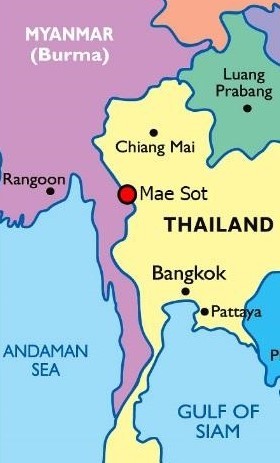You are using an out of date browser. It may not display this or other websites correctly.
You should upgrade or use an alternative browser.
You should upgrade or use an alternative browser.
Coup in Myanmar?
- Thread starter Samson
- Start date
Thousands of Myanmar protesters in standoff with police in Yangon

Police block a main street in Yangon as demonstrators attempt to march forward in first sign of street unrest following the coup.
Tens of thousands of people took to the streets of Yangon to denounce this week’s coup and demand the release of elected leader Aung San Suu Kyi, in the first such demonstration since the generals seized power.
“Military dictator, fail, fail; Democracy, win, win,” protesters chanted, calling for the military to free Nobel Peace laureate Aung San Suu Kyi and other leaders of her National League for Democracy (NLD) party who have been detained since the coup on Monday.
“Against military dictatorship” read the banner at the front of the march. Many protesters dressed in the NLD’s colour, red, and some carried red flags.
Images and videos posted on social media on Saturday showed police blocking a major intersection of Insein Road and Hledan junction in Yangon, as protesters attempt to march forward. Demonstrators peacefully chanted as their raised their hands in a three-finger salute.
Tens of thousands of people took to the streets of Yangon to denounce this week’s coup and demand the release of elected leader Aung San Suu Kyi, in the first such demonstration since the generals seized power.
“Military dictator, fail, fail; Democracy, win, win,” protesters chanted, calling for the military to free Nobel Peace laureate Aung San Suu Kyi and other leaders of her National League for Democracy (NLD) party who have been detained since the coup on Monday.
“Against military dictatorship” read the banner at the front of the march. Many protesters dressed in the NLD’s colour, red, and some carried red flags.
Images and videos posted on social media on Saturday showed police blocking a major intersection of Insein Road and Hledan junction in Yangon, as protesters attempt to march forward. Demonstrators peacefully chanted as their raised their hands in a three-finger salute.

Broken_Erika
Play with me.
https://www.bbc.com/news/world-asia-55960284BBC said:Myanmar coup: Internet shutdown as crowds protest against military
Myanmar's military rulers have shut down the country's internet as thousands of people joined the largest rally yet against Monday's coup.
A near-total internet blackout is in effect with connectivity falling to 16% of ordinary levels, said the monitoring group NetBlocks Internet Observatory.
In the main city, Yangon, crowds chanted "Military dictator, fail, fail; Democracy, win, win".
Police with riot shields have blocked the main roads into the city centre.
The internet shutdown happened hours after the military had blocked access to Twitter and Instagram to stop people mobilising for protests. Facebook had been banned a day earlier.
Many users had evaded the restrictions on social media by using virtual private networks (VPNs) but the more general blackout severely disrupted that.
TheMeInTeam
If A implies B...
- Joined
- Jan 26, 2008
- Messages
- 27,995
You describe the UN as if it is something wholly distinct from its constituent parts.
Not wholly, but distinct enough to merit distinction as an entity.
It does have an independent institutional personality, but it seems quite misguided to blame the UN when individual members prevent action. "The UN isn't doing enough" isn't a particularly meaningful criticism if it actually means "a particular actor is preventing the UN from doing enough".
The UN was also heavily designed to not operate without consensus.
Alternately, what should the UN be doing?
Is there a diaspora that could be doing something?
Alternately, what should the UN be doing?
Is there a diaspora that could be doing something?
amadeus
Apply directly to the forehead
I suppose any real change would have to come from inside. Burma’s strategic importance to the West seems pretty minimal, and going on sanctions alone didn’t topple them the last time.
I suppose any real change would have to come from inside. Burma’s strategic importance to the West seems pretty minimal, and going on sanctions alone didn’t topple them the last time.
I think Bojo would be aware of the Road to Mandalay. But not more

I think Bojo would be aware of the Road to Mandalay. But not more
Spot on. He had to be stopped from reciting it when in a Buddhist temple in Myanmar on a visit when he was Foreign Secretary.
https://www.theguardian.com/politic...-on-camera-reciting-kipling-in-myanmar-temple
Spot on. He had to be stopped from reciting it when in a Buddhist temple in Myanmar on a visit when he was Foreign Secretary.
https://www.theguardian.com/politic...-on-camera-reciting-kipling-in-myanmar-temple
I actually cheated and already knew of that ^_^
Why? I mean, I know nothing about the conditions there but it seems like the civilian government is a sham and was already powerless to stop the army from controlling the state.
My take is to take back control of the economy for their own enrichment.
You're correct that the civilian government was a sham. The constitution was written by the Army. The choice and design of the capital city was by the Army, specifically to make it easy to coup the civilian government. The Army has 25% of the seats in parliament, and also runs in the elections with a front party, and controls the ministry of defence and home affairs, and also appoints the vice president (who is now acting president after the coup). Some state-owned industries also remained under Army control. The civilian government basically only had control over bread and butter stuff, economy, healthcare, etc.
The NLD who led the civilian government increased their majority in the election and also were coming to an accommodation with ethnic minorities who have been rebelling against the central government on and off since independence. The Army probably saw this coalescing of civilian politicians around the NLD to challenge their power, and meanwhile the Myanmar economy has been growing massively in the past decade, and probably figured "might as well"
I suppose any real change would have to come from inside. Burma’s strategic importance to the West seems pretty minimal, and going on sanctions alone didn’t topple them the last time.
One would think a country's strategic importance to the West's main rival would mean it's strategically important to the West as well? It's extremely important to China for its natural resources and location between India and the rest of Southeast Asia and being situated just north of the Straits of Malacca through which huge volumes of trade to/from China flow.
It's borders look a bit artificial too (?). Although compared to the ridiculous corridor India has to the massive territory north of Burma... they aren't that bad.
Didn't neighboring Siam manage to stay independent until ww2?
Burma's borders actually follow natural geographical features, mountain ranges mostly, and a few rivers. The British drew the border between Burma and India/Bangladesh but they followed mountains as well.
Ethnic Burmese (Bamar) mainly lived in the Irrawaddy valley in the centre of the valley, but their control/influence over the highlands were a result of their own precolonial imperialism. If the Burmese had had their way in the early 1800s they'd be in control of Assam and all those northeastern Indian states as well.
Siam always stayed independent. Signed an alliance with Japan to escape full occupation, and worked with the Allies behind the scenes to escape enemy country status after the war.
In Myanmar, protesters urge police to join democracy fight

Is that blood on the road?
As thousands of protesters once again take to the streets across Myanmar in escalating protests against last week’s military coup, some have been met with force by the police for the first time.
Videos on social media showed police firing water cannon at protesters in the isolated capital of Naypyidaw, as they demanded an end to military rule and the release of Aung San Suu Kyi
Their placards urged the police to stand with the protesters, as part of a growing civil disobedience movement that has already won support from doctors, teachers and other government workers.
Protesters seemed to be hoping to separate the police force from the military, despite the 2008 military-drafted constitution giving the armed forces authority over the police. Rank-and-file members of the police force are thought to be more sympathetic to the cause of the pro-democracy protesters.
Political analyst Khin Zaw Win said the “police are closer than the military” to Aung San Suu Kyi and would be more “likely to stand with protesters” than soldiers.
“Whether larger numbers join the protesters depends on senior officers coming in, on the duration of the protests, and the incidence of violence,” he said.
Videos on social media showed police firing water cannon at protesters in the isolated capital of Naypyidaw, as they demanded an end to military rule and the release of Aung San Suu Kyi
Their placards urged the police to stand with the protesters, as part of a growing civil disobedience movement that has already won support from doctors, teachers and other government workers.
Protesters seemed to be hoping to separate the police force from the military, despite the 2008 military-drafted constitution giving the armed forces authority over the police. Rank-and-file members of the police force are thought to be more sympathetic to the cause of the pro-democracy protesters.
Political analyst Khin Zaw Win said the “police are closer than the military” to Aung San Suu Kyi and would be more “likely to stand with protesters” than soldiers.
“Whether larger numbers join the protesters depends on senior officers coming in, on the duration of the protests, and the incidence of violence,” he said.

Is that blood on the road?
Last edited:
FriendlyFire
Codex WMDicanious
Isnt that the three fingers salute from the movie Hunger Games ?
At least the temple near the Mandalay Pagoda is in very typical Siamese style (including the green colors)...
The border does look forced in the east (to Siam/Thailand). That thin peninsula doesn't look defensible at all.
Burma and Thailand share more culturally than either cares to admit.
The thin peninsula is split east-west because of a mountain range north-south. The entire isthmus was contested between Siam and Burma with Siam mostly having the upper paw because Burma was mostly disunited, but Burma took it in the 1760s
Isnt that the three fingers salute from the movie Hunger Games ?
It is. Protesters in Thailand have been using it against the military there as well.
Broken_Erika
Play with me.
https://www.bbc.com/news/world-asia-56067423BBC said:Myanmar coup: Protesters face up to 20 years in prison under new law
Myanmar's military has warned anti-coup protesters across the country that they could face up to 20 years in prison if they obstruct the armed forces.
Long sentences and fines will also apply to those found to incite "hatred or contempt" towards the coup leaders, the military said.
The legal changes were announced as armoured vehicles appeared on the streets of several cities.
Hundreds of thousands of people have taken part in protests in recent days.
The demonstrators are demanding the release from detention of their elected leaders, including Aung San Suu Kyi, and the restoration of democracy in Myanmar, also known as Burma.
On Monday, Ms Suu Kyi's lawyer said she would be detained for a further two days. She will then be tried via video link at a court in the capital Nay Pyi Taw on Wednesday, Khin Maung Zaw added.
- What will the military do now?
- The shooting of a young protester
- 'Down with the military - release our leaders!'
Ms Suu Kyi was rounded up with other members of the government on 1 February, but her detention was due to end on 15 February, according to Reuters news agency.
The charges against her include possession of unlawful communication devices - walkie-talkies used by her security staff.
Her party was elected in a resounding victory last November, but the military has alleged voter fraud without providing proof.
What are the signs of a crackdown?
The military's heightened presence is the latest sign of a potential crackdown on opposition to the coup.
The ruling junta has also announced a series of legal changes, imposing long prison sentences and fines on anyone found to incite hatred towards the military, "by words, either spoken or written, or by signs, or by visible representation".
In a statement posted on a military website on Monday, it said that people preventing the security forces from carrying out their duties could face 20 years in prison, while those found to stir up fear or unrest in public could be imprisoned for terms of three to seven years.
The news came hours after the internet was restored. Telecoms operators said they had been told to shut off services from 01:00 to 09:00 local time, Sunday into Monday (18:30 to 02:30 GMT).
As demonstrators gathered in the central city of Mandalay again on Monday, there were reports of security forces firing rubber bullets to disperse crowds.
In footage posted on social media, what sounds like gunshots can be heard as crowds flee, with several people later appearing to display injuries.
Police in the city were also reported to have used sling-shots against protesters and were met with volleys of bricks.
In the city of Myitkyina, in Kachin state, shooting could also be heard as security forces clashed with anti-coup demonstrators. It was not clear whether rubber bullets or live rounds were being fired.
Five journalists were among those arrested in the city, but they were later released.
In Yangon, armoured vehicles were seen on the streets for the first time since the coup. Monks and engineers led a rally there. Protests focused on the central bank building, the US and Chinese embassies, and the city headquarters of Aung San Su Kyi's National League for Democracy.
Students protested in Nay Pyi Taw. Dozens were arrested and later released.
A doctor at a hospital in Nay Pyi Taw told the BBC the security forces were carrying out night-time raids on homes.
"I'm still worrying because they [made] a curfew statement... not to go outside between 20:00 and 04:00, but this makes a time for the police and soldiers to arrest people like us," said the doctor, who cannot be named for safety reasons.
"The previous day they [broke] into the house, cut down the fence, entered and arrested people unlawfully. That's why I'm also worrying."
An office of the US embassy in Yangon warned US nationals to stay indoors during curfew hours.
On Saturday, the military said arrest warrants had been issued for seven prominent opposition campaigners and warned the public not to harbour opposition activists fleeing arrest.
Video footage showed people reacting with defiance, banging pots and pans to warn their neighbours of night-time raids by the security forces.
The military on Saturday also suspended laws requiring court orders for detaining people longer than 24 hours and for searching private property.
Arrested for praying?
Police detained young fortune teller Hein Min Aung in South Okapala township on Thursday, after video footage went viral in which he is seen lighting candles and praying for the failure of the dictatorship.
Causing traffic jams seems to be the tactic today:
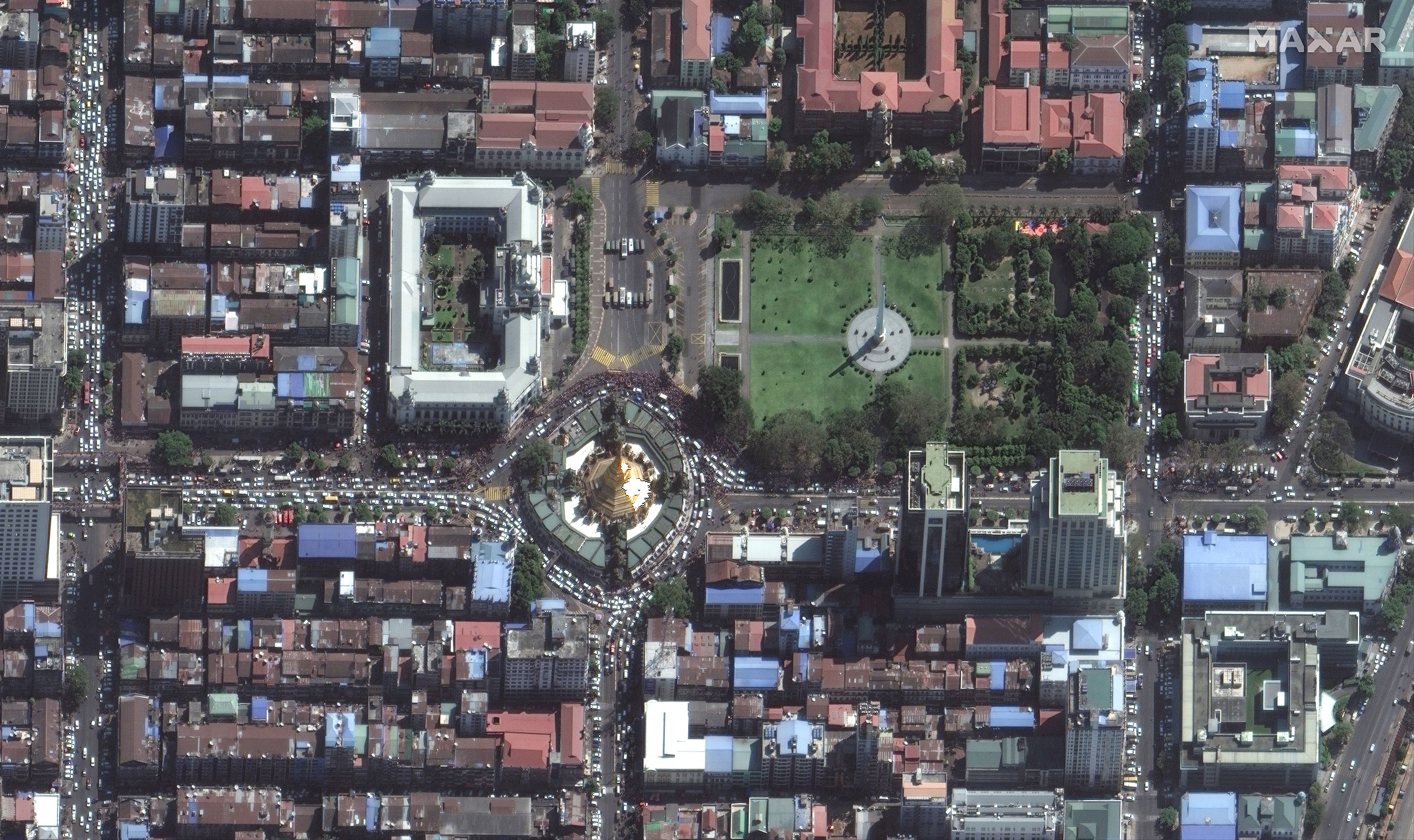
A powerful picture from Yangon shows a crowd of protestors amassing near the city hall. A crowd of hundreds appears gathered between the Sule Pagoda, Maha Bandula Park, and City Hall. More than a dozen large vehicles, which appear to be army trucks and police water cannons, block the road facing City Hall.
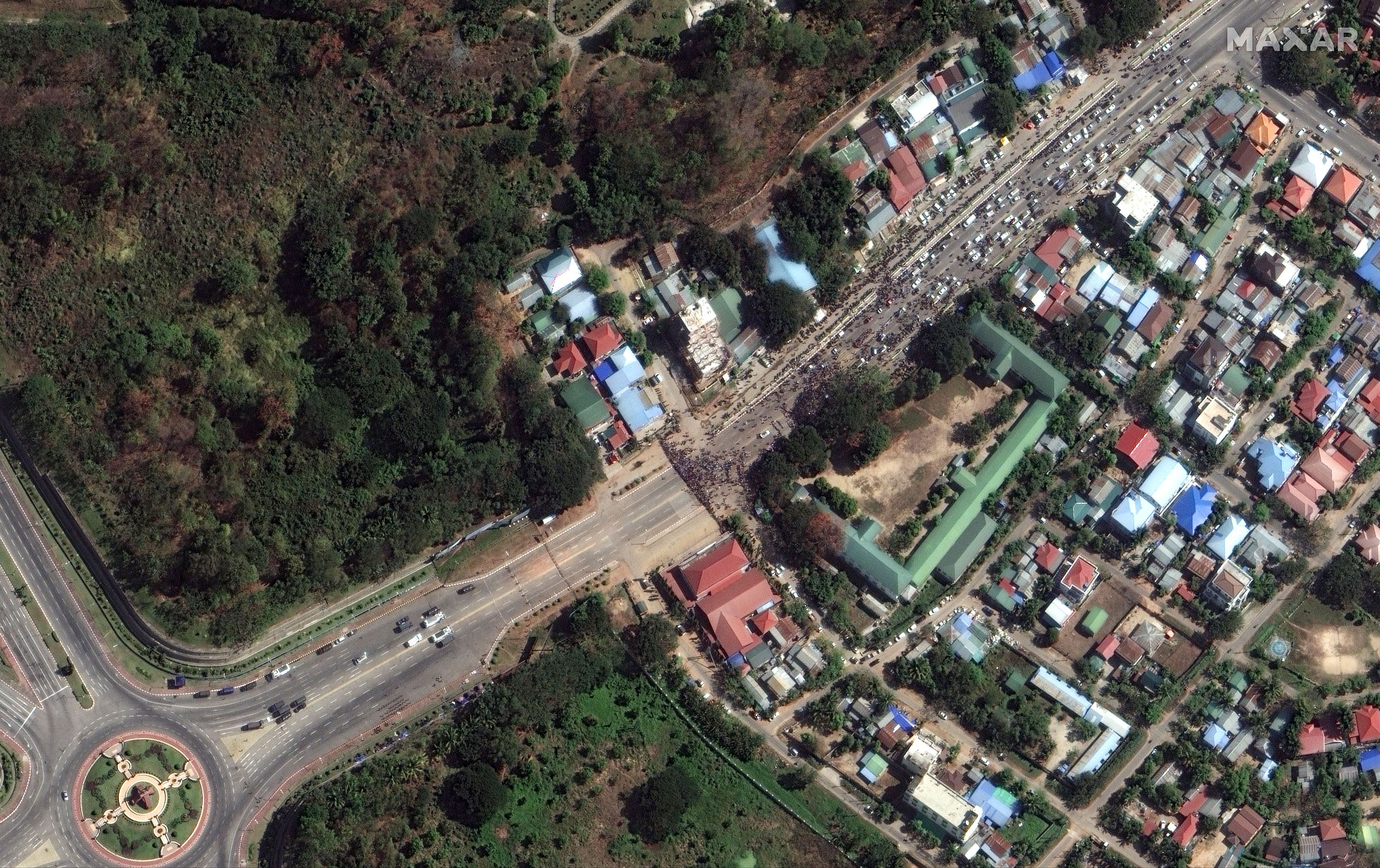
This image, dated February 13th, show protestors in Naypyitaw, face to face with what appears to be a line of police along the central Taungnyo Road, causing them to stop in the highway.
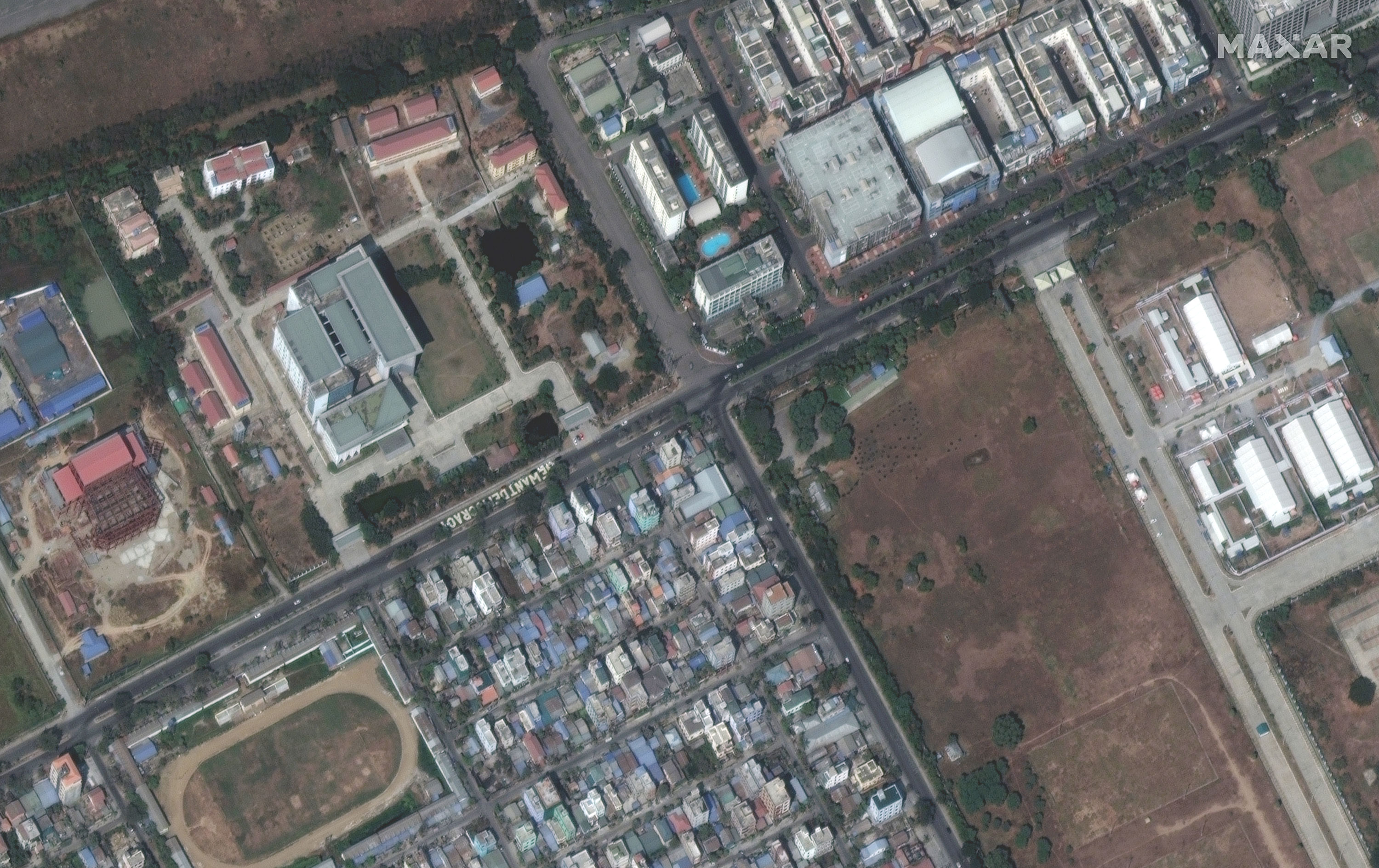
One image taken Tuesday shows a vast slogan written on a main thoroughfare of the city Mandalay, near what appears to be the Ministry of Information, declaring "WE WANT DEMOCRACY."
Myanmar’s coup opponents gather for major protests

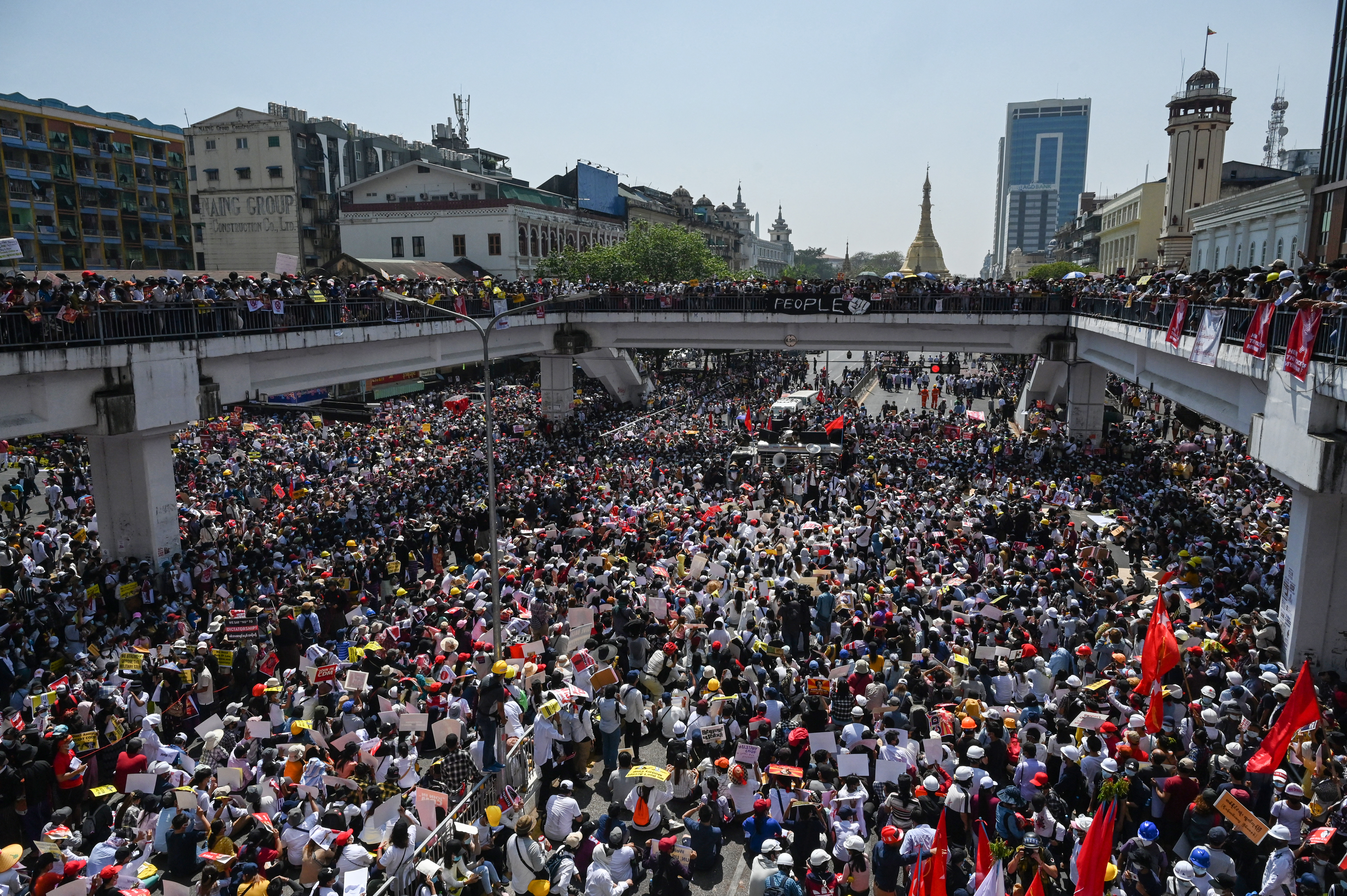

Thousands of people took to the streets of Yangon on Wednesday to show their anger at the military coup in Myanmar amid rising concern of violence in the troubled Southeast Asian nation.
Protesters called for massive rallies to shatter the army’s claim that people backed its February 1 move to seize power from civilian leader Aung San Suu Kyi and her National League for Democracy (NLD) after they were returned to government in a landslide in November’s elections.
Along with the larger crowds, people also stopped their cars in the streets or at key junctions – their bonnets open in mass ‘breakdowns’ – as a way of thwarting any military advance.
Tom Andrews, the United Nations’ special rapporteur on human rights in Myanmar, said earlier he was “terrified” of an escalation in violence, saying he had received reports of troop movements around the country and feared the protesters were facing real danger.
There are some pretty cool satellite images of the protests:Protesters called for massive rallies to shatter the army’s claim that people backed its February 1 move to seize power from civilian leader Aung San Suu Kyi and her National League for Democracy (NLD) after they were returned to government in a landslide in November’s elections.
Along with the larger crowds, people also stopped their cars in the streets or at key junctions – their bonnets open in mass ‘breakdowns’ – as a way of thwarting any military advance.
Tom Andrews, the United Nations’ special rapporteur on human rights in Myanmar, said earlier he was “terrified” of an escalation in violence, saying he had received reports of troop movements around the country and feared the protesters were facing real danger.

A powerful picture from Yangon shows a crowd of protestors amassing near the city hall. A crowd of hundreds appears gathered between the Sule Pagoda, Maha Bandula Park, and City Hall. More than a dozen large vehicles, which appear to be army trucks and police water cannons, block the road facing City Hall.

This image, dated February 13th, show protestors in Naypyitaw, face to face with what appears to be a line of police along the central Taungnyo Road, causing them to stop in the highway.

One image taken Tuesday shows a vast slogan written on a main thoroughfare of the city Mandalay, near what appears to be the Ministry of Information, declaring "WE WANT DEMOCRACY."
Myanmar’s coup opponents gather for major protests
Critics of Myanmar’s military coup gathered on Wednesday in a major show of opposition to the army’s assertion of public support for overthrowing elected leader Aung San Suu Kyi.
News reports said security forces were surrounding the demonstrators.
News reports said security forces were surrounding the demonstrators.



Last edited:
Myanmar police kill 2 in bloodiest day of anti-coup protests

A soldier carries a sniper rifle during a demonstration against the coup in Mandalay
At least two people have been killed and several wounded in Myanmar’s second city of Mandalay when security forces opened fire to disperse people protesting against the country’s military coup, according to emergency service workers and other witnesses.
In Mandalay, a shipyard raid turned violent on Saturday when security forces opened fire on demonstrators trying to stop the arrest of workers taking part in the growing anti-coup movement. The clash started with the demonstrators flinging rocks, but authorities retaliated by opening fire, sending them fleeing in fear.
In addition to the deaths, which were also reported by local media, Ko Aung, leader of the Parahita Darhi volunteer emergency service agency, told Reuters news agency 20 people were wounded. At least five people were injured by rubber bullets and had to be carried away in ambulances, according to an Associated Press news agency journalist who witnessed the violence.
“They beat and shot my husband and others,” a resident told AFP in tears. “He was standing on the side and watching the protest but the soldiers took him away.”
In Mandalay, a shipyard raid turned violent on Saturday when security forces opened fire on demonstrators trying to stop the arrest of workers taking part in the growing anti-coup movement. The clash started with the demonstrators flinging rocks, but authorities retaliated by opening fire, sending them fleeing in fear.
In addition to the deaths, which were also reported by local media, Ko Aung, leader of the Parahita Darhi volunteer emergency service agency, told Reuters news agency 20 people were wounded. At least five people were injured by rubber bullets and had to be carried away in ambulances, according to an Associated Press news agency journalist who witnessed the violence.
“They beat and shot my husband and others,” a resident told AFP in tears. “He was standing on the side and watching the protest but the soldiers took him away.”

A soldier carries a sniper rifle during a demonstration against the coup in Mandalay
Similar threads
- Replies
- 6
- Views
- 656
- Replies
- 8
- Views
- 769

